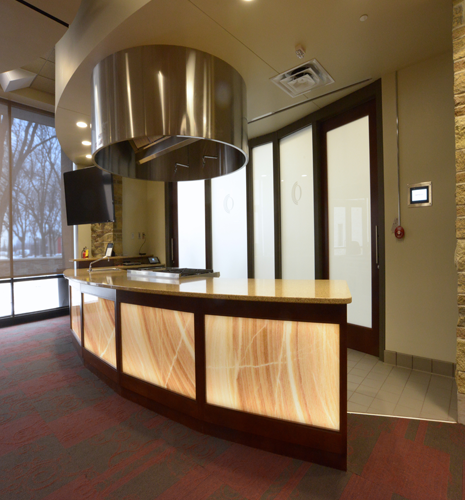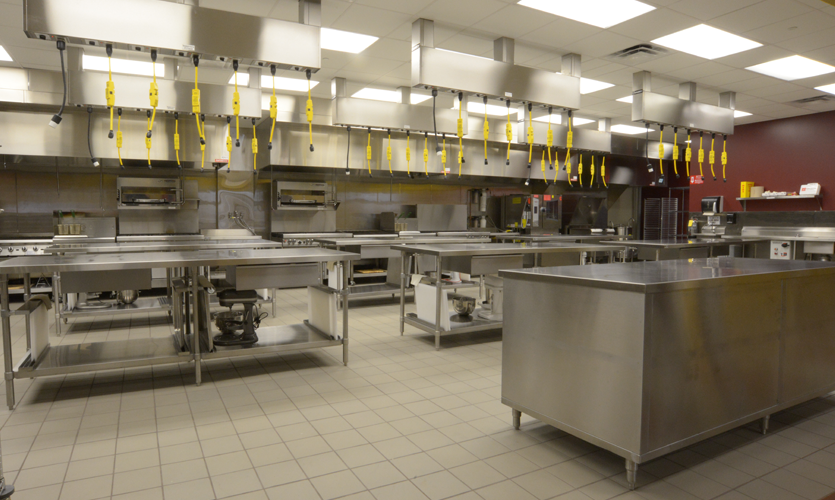Culinary Arts Center Renovation
Owens Community College

Owens Community College selected SSOE to perform design and construction administration new Culinary Arts Center, located at the Toledo-area campus. SSOE scope of services included engineering, interior design, security / access control, and IT / technology design services. SSOE worked closely with Owens’ administration to meet an expedited design and construction schedule. Design was completed using a 100% BIM platform, with 3D sections and details used throughout the design process to aid shareholders in envisioning and understanding the design intent and layout of the space.
The project included the renovation of an existing, 14,000 SF vacant space. The new Culinary Center offers three unique laboratories – Culinary Skills, Restaurant Skills, and Food Science and Baking. The Culinary Skills Laboratory incorporates the latest cooking equipment and devices, allowing students to practice technical skills. The Restaurant Skills Laboratory simulates what students would find in the industry, including a beverage wait station and expediting cooking stations. The Food Science and Baking Laboratory is equipped with heat and humidity controls to allow students to learn advanced pastry skills. In addition the space also hosts a large dining area for holding lunches and special events, providing students with real-world experience in creating menus, preparing and plating food, and serving. A demonstration station, complete with cameras and television screens and a new outdoor gathering area were also added to provide additional functionality for special events.
Renovations to the center included state-of-the-art equipment and technology upgrades, such as new access-control door hardware and additional security and monitoring equipment.



 Ohio Bureau of Criminal Identification and Investigation at BGSU
Ohio Bureau of Criminal Identification and Investigation at BGSUAutodesk Construction Cloud (ACC) is SSOE’s enterprise-wide project delivery platform. We partner with the Autodesk Product team and have research access. Use of the AI Assistant allows our design teams, owners, and general contractors the ability to query the project specifications for quality, answers, and more rapid responses to RFIs, submittals, or issues.
SSOE has developed a proof-of-concept to use an AI Agent to act as a Master Engineer and Architect trained in SSOE’s processes, best-known-methods, and trainings. Our data structure is being remodeled to enable better use of our proprietary knowledge to train the agent on the ‘SSOE way’.
SSOE is actively piloting AI Chat large language models (LLMs) or copilots that use Natural Language Processing (NLP) to streamline both design and development tasks, transforming how our teams interact with software and each other.
By integrating chat LLM engines into platforms like Revit, we’re enabling users to prompt complex actions using simple, conversational commands. In Revit, this means automating tasks such as modeling elements, cleaning up parameter data, managing annotations and dimensions, and organizing sheets—without writing scripts. These automations and quality prompts can be shared across project teams, accelerating workflows and reducing manual effort.
Similarly, our internal Software Development Community is leveraging GitHub Copilot to expedite coding tasks. Developers can generate and refine code using NLP prompts, tapping into GitHub’s extensive Repo to move faster from concept to implementation.
Together, these tools represent a shift from traditional, expert-driven scripting to intuitive, AI-assisted automation, unlocking new levels of efficiency and scalability across our projects.
We helped our client visualize and optimize façade design for occupant comfort—long before breaking ground through the use of the Autodesk Forma tool. It allows the designer to rapidly experiment with the building’s geometry and façade design to promote sustainability, prioritizing quality of spaces and comfort for end uses, especially in extreme climates (daylighting and microclimate analysis tools) at the project’s exact geographic location, using location-specific environmental data.
Discover how SSOE is using Autodesk Forma to improve sustainability outcomes for industrial projects: SSOE Group: Improving sustainability outcomes for industrial projects with Autodesk Forma.
SSOE is utilizing Microsoft Copilot Edge and M365 to significantly enhance work efficiency and accuracy across various departments. Copilot is accessible to all staff after training. Key areas of application include using it as a writing assistant, for idea generation, document summarization and generation, research assistant, excel assistant, programming code assistant, language translations, product comparison and data analysis. Use of Copilot has become part of the everyday life of SSOE employees who have identified key ways it can help them become more efficient with their daily tasks as well as more accurate in their deliverables.
Today, 100% of SSOE employees have taken the voluntary training and have access to Copilot Edge, achieving early our October 1, 2025 goal.
We found ourselves in need of a more robust tool to enhance resource forecasting and staff assignment capabilities. Instead of waiting for the perfect tool, we’re building it. SSOE’s in-house technology team has developed and piloted a tool that aims to forecast optimal staff mix and duration for new projects against existing workload to better understand capacity and manage resources efficiently. Additionally, the tool will allow teams to identify gaps to optimal staff mix.